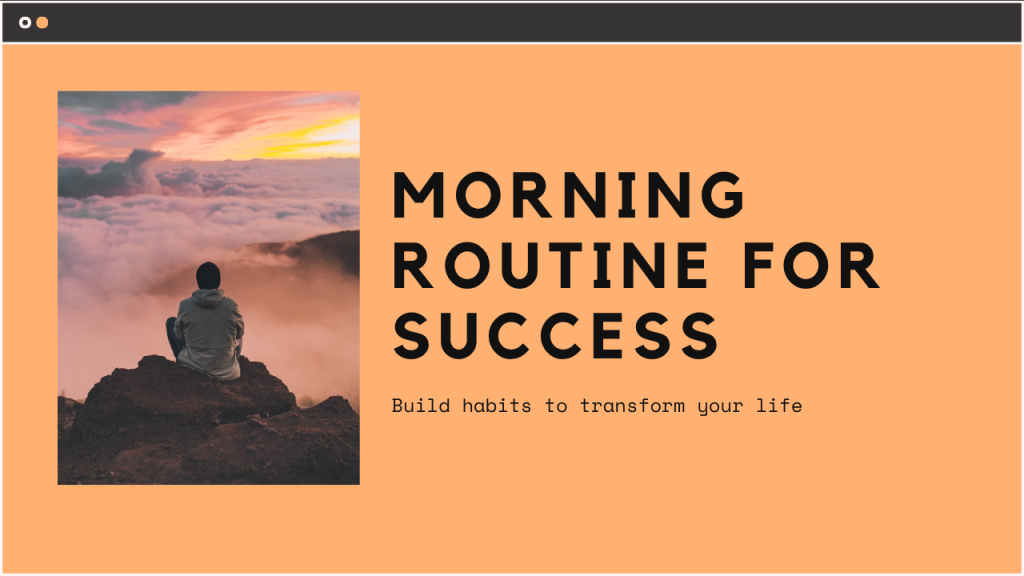Introduction: Why Your Morning Routine Matters More Than You Think
Have you ever noticed how some days you seem unstoppable — knocking out tasks with laser-like focus, handling problems calmly, and feeling energized long into the afternoon? Chances are, those days didn’t start with frantic scrambling or hitting the snooze button multiple times.
Your morning sets the tone for everything that follows. Countless high achievers — from CEOs and athletes to creatives and scientists — swear by a carefully crafted morning routine. But it’s not just anecdotal. Neuroscience shows that the early hours can be your most productive because of higher dopamine levels and stronger willpower reserves.
In short: mornings matter.
This guide will show you exactly how to build a morning routine for success — one that suits your goals, biology, and lifestyle. You’ll learn how to stack positive habits, avoid common pitfalls, and create a ritual that makes you feel focused and fulfilled every day.

The Science Behind Successful Morning Routines
Before we jump into building your routine, let’s understand why mornings are so powerful.
Your Brain Is Primed for Focus
Right after waking, your prefrontal cortex (responsible for decision-making and self-control) is rested. Willpower is like a muscle that fatigues through the day. That’s why getting important tasks done in the morning — before decision fatigue sets in — gives you a major advantage.
Dopamine and Motivation Are Naturally Higher
Dopamine peaks after rest, fueling motivation, learning, and goal-driven behavior. Morning routines that leverage this can supercharge your drive for the rest of the day.
It Sets a Psychological “Win”
Starting the day intentionally — instead of reacting to emails or notifications — sends a powerful signal to your brain that you’re in control, building momentum for more wins.
How to Build a Morning Routine for Success: 8 Key Steps
Here’s a step-by-step blueprint to help you craft a morning routine that energizes you and aligns with your personal vision of success.
1. Define What “Success” Looks Like for You
Your morning routine should serve your unique life. For some, success might mean crushing professional goals. For others, it’s staying centered, creative, or physically healthy.
Ask yourself:
- What would make me feel proud at the end of today?
- Which areas of my life need more intentional attention right now (career, relationships, health, personal growth)?
- How do I want to feel by mid-morning? Energized? Calm? Confident?
This clarity ensures your routine isn’t just copied from some influencer on YouTube — it’s tailored to you.
2. Start with One Keystone Habit
Trying to overhaul your entire morning at once rarely sticks. Instead, pick a single keystone habit — a practice that naturally encourages other positive behaviors.
Some examples:
- Exercise: Boosts energy, mood, and cognitive function for hours.
- Meditation: Trains focus, reduces stress, and makes you less reactive.
- Reading or journaling: Stimulates creativity and reflection.
Build your routine around this core activity first. Once it’s consistent, layer on other habits.
3. Wake Up at a Consistent Time
The most successful morning routines start the night before. Your body’s circadian rhythm thrives on regularity. Going to bed and waking up at the same time daily:
- Improves sleep quality (even if total hours are unchanged).
- Makes early rising feel easier, not like punishment.
- Stabilizes hormones tied to hunger, energy, and mood.
If you currently wake at wildly different times, adjust gradually by 15–20 minutes every few days until you reach your target.
4. Avoid Your Phone for the First 30–60 Minutes
One of the fastest ways to sabotage a successful morning is to immediately dive into emails, news, or social media. This puts your brain in reactive mode, hijacking your priorities.
Instead:
- Keep your phone on airplane mode or in another room.
- Use an old-fashioned alarm clock.
- Spend your first hour investing in yourself, before you start answering to the world.
5. Move Your Body (Even Just a Little)
Exercise is a common thread in the morning routines of many high performers. Why? Morning movement:
- Raises your core temperature and metabolism.
- Increases endorphins and serotonin, improving mood and stress resilience.
- Enhances focus by stimulating blood flow to the brain.
Don’t worry if you’re not a gym person. Try:
- A 5-minute dynamic stretch sequence
- A brisk 10-minute walk outside
- 20 push-ups and squats on your bedroom floor
The key is consistency over intensity.
6. Feed Your Mind: Read, Journal, or Visualize
This is about priming your mindset for the day ahead.
Options include:
- Reading: A few pages of a book on personal growth, business, philosophy, or spirituality.
- Journaling: Try morning pages (stream-of-consciousness writing) or jot down three things you’re grateful for.
- Visualization: Spend 2–3 minutes vividly imagining achieving your goals for the day. Research shows this builds neural pathways that make success more likely.
7. Eat (or Drink) Something That Fuels You
Depending on your body and preferences, breakfast might be essential or optional. Either way:
- Hydrate first — after hours of sleep, your brain needs water.
- Choose foods that keep blood sugar stable: think eggs, oats, yogurt, nuts, or smoothies.
A quick protein-rich meal can sharpen mental performance and prevent the mid-morning slump.
8. Set Intentions for the Day
Before you dive into work, take a moment to decide:
“What’s the most important thing I can accomplish today that will make everything else easier or unnecessary?”
Write it down. This clarity reduces stress and distractions. Even if the rest of the day gets messy, hitting your top priority leaves you feeling successful.
Sample Morning Routines from Successful People
Need inspiration? Here are condensed morning frameworks drawn from various achievers.
The Creative Entrepreneur
- Wake at 6:30 AM, hydrate
- Read or journal for 20 minutes
- Do 30 minutes of light yoga or walking
- Plan top 3 priorities
- Start deep work by 8 AM
The Fitness-Focused Leader
- Wake at 5 AM, immediately drink water
- 45-minute gym session
- Protein smoothie + quick email scan
- Visualize goals for 5 minutes
- Begin meetings or strategic work by 7:15 AM
The Mindful Professional
- Wake at 6 AM, avoid phone
- Meditate 10–15 minutes
- Write gratitude list
- Prepare a healthy breakfast
- Review day’s calendar calmly, start work at 8
Notice: no two look the same. Adapt, experiment, and build yours from elements that resonate.
Common Mistakes That Ruin Morning Routines
Even the best plans can be derailed. Watch out for:
Unrealistic Expectations
Trying to cram in a 90-minute workout, hour-long meditation, and a gourmet breakfast is a fast track to burnout. Start small.
Poor Sleep Hygiene
You can’t have a great morning if your nights are a mess. Avoid caffeine late, keep screens out of the bedroom, and wind down properly.
Letting Others Set Your Agenda
Checking messages first thing lets someone else decide what’s urgent. Guard your mornings.
All-or-Nothing Thinking
If you wake up late or skip a step, it’s not ruined. Do what you can and get back on track tomorrow.

Advanced Tips to Supercharge Your Morning Routine
Once your basics are solid, try these next-level strategies:
- Use habit stacking: Attach new habits to existing ones. E.g. “After I brush my teeth, I’ll stretch for 5 minutes.”
- Leverage rewards: Pair your morning routine with something you love — like your favorite podcast only during your morning walk.
- Track progress: Simple checkboxes in a journal can keep motivation high.
- Prep the night before: Lay out workout clothes, set up your journal, pre-make breakfast if needed.
FAQs on Building a Morning Routine for Success
Q: How long does it take to build a solid morning routine?
On average, it takes 21–66 days to form a habit, depending on complexity. Be patient and consistent.
Q: Should I wake up early even if I’m a night owl?
Not everyone needs to rise at 5 AM. Focus on waking up at a time that lets you start the day proactively, with a consistent schedule and enough rest.
Q: Is it bad to skip breakfast?
Not necessarily. Intermittent fasting can work well for some. Just ensure hydration and balanced meals later.
Q: How do I stay motivated?
Tie your routine to your bigger life goals. Also, allow flexibility — your morning ritual should feel rewarding, not like punishment.
Conclusion: Build Your Mornings, Build Your Life
A successful morning routine isn’t about rigidly copying someone else’s habits. It’s about creating a set of rituals that prime your mind, body, and spirit for the day ahead.
- Start with what matters most to you.
- Build gradually, focusing on consistency.
- Tweak and evolve your routine over time.
As author Hal Elrod says in The Miracle Morning,
“How you wake up each day and your morning routine (or lack thereof) dramatically affects your levels of success in every single area of your life.”



